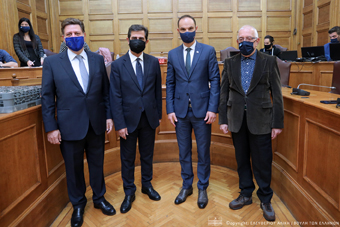Press Office
Athens, 3 November
European Affairs Committee and Committee on National Defence and Foreign Affairs briefed on current developments regarding Slovenian Presidency of EU Council priorities

The Special Standing Committee on European Affairs and the Standing Committee on National Defence and Foreign Affairs held a joint meeting to discuss current issues in the framework of the priorities of the Slovenian Presidency of the Council of the European Union. The members of the Committees were briefed by the Foreign Minister of Slovenia Anže Logar. The meeting was attended by the Alternate Minister of Foreign Affairs, in charge of Affairs Issues Miltiadis Varvitsiotis.
In his introductory remarks the 1st Vice-President of the Hellenic Parliament and Chairman of the European Affairs Committee Nikitas Kaklamanis said the Slovenia assumed its second Presidency at a difficulty time, in the midst of the health crisis and the efforts for economic recovery, but also in the midst of foreign policy challenges, such as the crisis in Afghanistan, the energy crisis, Turkish provocative behaviour in occupied Cyprus and the Southeastern Mediterranean, and the situation in Belarus.
Among the priorities of the Slovenian Presidency, the issue of the Conference on the Future of Europe is of particular interest, noted Mr Kaklamanis, as well as developments vis-à-vis enlargement in the Western Balkans, the “green” transition and the strengthening of the rule of law. However, regarding the Conference on the Future of Europe, Mr Kaklamanis found the role of national MPs to be unclear, and that their influence should not be mitigated by the bureaucracy of the Joint Secretariat of the Council and the Commission. Lastly, Mr Kaklamanis praised Slovenia for the impeccable organisation of the parliamentary dimension of the Presidency and for holding many informal but useful online meetings.
The Foreign Minister of Slovenia Anže Logar referred to the efforts being made by the Slovenian Presidency to reach a consensus on important issues of concern to the member states, such as the EURODAC Agreement, migration, the situation in Afghanistan, dealing with the Taliban and the situation in Belarus.
At the same time, Mr Logar expressed Slovenia’s support towards Greece regarding the unacceptable threats it receives from the neighbouring country and added that Turkey’s unilateral actions in the Eastern Mediterranean have a negative impact on the EU and this is why the respect for European and International Law must be insisted upon in the talks with Turkey.
Regarding the control of the EU’s external borders, the Slovenian Foreign Minister stressed that for Slovenia it is a basic prerequisite in the process to move forward with the Directive on Migration and Asylum. Furthermore, Mr Logar noted that in the debate on lifting the veto on foreign policy and enlargement of the Union issues in the framework of the Conference on the Future of Europe, Slovenia does not wish to change the existing legal framework, but to maintain and use it the most effective way possible.
The Alternate Foreign Minister in charge of European Affairs Miltiadis Varvitsiotis welcomed the priority of the Slovenian Presidency for a more resilient Europe, which is already in the next phase of the pandemic and expressed his support for the implementation of the Next Generation EU programme to shield the European economy and transition to a green and digital age.
Regarding the rule of law he noted that Greece supports the procedures of the European Commission, as well as the periodic scrutiny of the member states by the European Council, and also the process of cooperation between member states in cases of violations. Regarding migration, the Alternate Foreign Minister stressed that nothing can be agreed upon unless everything is agreed and that the new pact should be adopted in its entirety and not in fragments. The external dimension of migration policy should be properly served in terms of agreements with countries of origin, transit, rapid returns and burden sharing between member states, said Mr Varvitsiotis. Lastly, he expressed Greece’s support for the enlargement process of the Western Balkans and expressed his concern about the developments in North Macedonia, underlining the need for the true and correct implementation of all provisions of the Prespa Agreement.
For his part, the Chairman of the Committee on National Defence and Foreign Affairs Konstantinos Gioulekas, in his introductory speech, raised the issue of solidarity between EU member states and added that solidarity cannot be limited to statements, but expressed with actions and pointed out that Turkey is armed by EU member states. Mr Gioulekas then stressed that Greece as a gateway for migrants and refugees is under great pressure and he pointed out that no member state should carry a disproportionate amount of responsibility.
High resolution images
Back